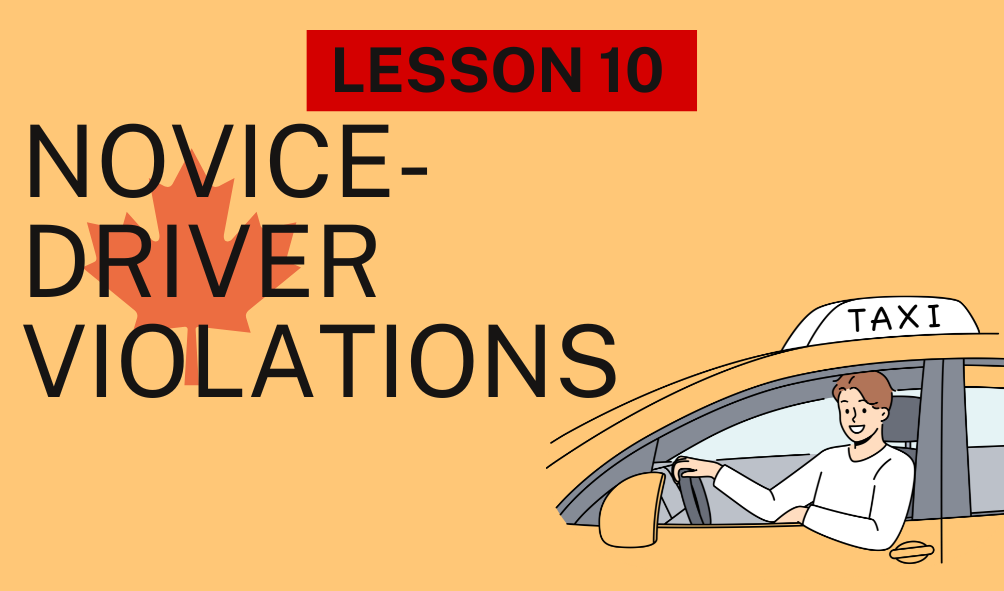Novice-driver violations in Canada encompass various infractions specific to individuals in the early stages of obtaining a driver’s license. Common violations include exceeding passenger restrictions, ignoring zero-tolerance policies for alcohol, and driving during restricted hours. Failure to display the required novice driver decal, accumulating excessive demerit points, and not completing mandatory educational programs are also notable offenses. Consequences for these violations may include fines, demerit points, and participation in corrective courses, emphasizing the importance of responsible driving behavior during the initial phases of licensing.
Graduated Permitting Overview:
Graduated permitting is a staged methodology that guides new drivers through various stages, each with its own arrangement of rules and necessities. The idea is to gradually expose inexperienced drivers to more difficult driving situations while reducing the risks associated with inexperience. The three fundamental stages regularly incorporate a student’s grant, a temporary or transitional permit, and, lastly, a full, unlimited permit.
Normal Infringement for Fledgling Drivers:
1. Traveler Restrictions:
Fledgling drivers frequently face impediments to the quantity of travelers they can move during specific hours. This limitation expects to limit interruptions and support centered driving. Disregarding traveler limitations can bring about punishments, including fines or the expansion of the fledgling stage.
2. Abstinence from alcohol:
During the initial stages of licensing, many provinces and territories in Canada have a zero-tolerance policy regarding alcohol consumption. Drivers who are new to the road and are caught operating a vehicle while under the influence of alcohol may have their licenses immediately suspended, as well as be required to participate in educational programs.
3. Driving During Limited Hours:
Beginner drivers are in many cases subject to limitations on driving during explicit hours, regularly during the late evening or early morning. This limit is planned to keep people away from high-risk circumstances and improve street wellbeing. Abusing these hour limitations can prompt punishments, supporting the significance of being capable of using time effectively for fledgling drivers.
4. Inability to Show a Fledgling Driver Decal:
A few regions require beginner drivers to show an unmistakable decal on their vehicles to make other street clients aware of their status. Fines and additional penalties may result if this decal is not displayed. The decal fills in as a viewable sign for policing individual drivers to know about the driver’s graduated permitting status.
5. Surpassing Bad Mark Points:
The bad mark focuses framework is predominant across Canada, appointing focuses for different criminal traffic offenses. Beginner drivers gathering unreasonable fault focuses within a predetermined time span might confront results like permit suspension, obligatory courses, or an expansion of the fledgling time frame. This underscores the significance of keeping a perfect driving record during the beginning phases of permitting.
6. Not Finishing Required Instructive Programs:
Fledgling drivers might be expected to take part in unambiguous instructive projects, like protective driving courses, during their graduated permitting period. Neglecting to finish these compulsory projects can bring about punishments and may defer the movement to the next permitting stage.
7. Usage of a cell phone while driving:
For novice drivers, using cell phones and other electronic devices is frequently prohibited. Abusing these limitations might prompt fines and negative marks. Complying with these guidelines advances mindfulness and lessens the probability of interruptions while driving.
Results of amateur driver violations:
The outcomes of amateur driver infringement in Canada are intended to be instructive and remedial, planning to build up the significance of a capable driving way of behaving. Fines, demerit points, obligatory educational courses, or an extension of the novice stage are all examples of penalties. In extreme violation cases, rehashed infringement or serious offenses might prompt permit suspension or scratch-off.
Programs of Instruction for New Drivers
To address the special difficulties faced by beginner drivers, numerous regions and domains in Canada have laid out instructive projects. These projects center around improving mindfulness, advancing capable driving propensities, and resolving explicit issues looked at by beginner drivers, like interruptions, impeded driving, and chance administration.
After certain violations or as part of the graduated licensing requirements, participation in these programs may be required. Fledgling drivers benefit from mastering important abilities that add to their general wellbeing out and about, making for a long period of mindful driving.
Support and Engagement from the Community:
Local area commitment assumes an imperative role in supporting beginner drivers. Instructive drives, mindfulness missions, and associations with schools and nearby associations add to a culture of capable driving. Peer support programs, where experienced drivers guide beginner drivers, can likewise assist with building up certain driving propensities and cultivate a feeling of local area obligation.
Innovation and Beginner Driver Safety:
Progressions in innovation have given devices to upgrade beginner driver security. Versatile applications, dashboard cameras, and telematics gadgets can be utilized to screen driving behavior, empower safe practices, and give input to amateur drivers. These advances, when utilized mindfully, add to progressing learning and improvement for amateur drivers.

Conclusion about driver violations:
In conclusion, novice Canadian drivers must comprehend and adhere to the graduated licensing system’s rules and restrictions. Amateur driver infringement is dependent upon legitimate results as well as acting as an open door for training and improvement. The accentuation on capable driving ways of behaving, local area commitment, instructive projects, and mechanical headways by and large adds to a more secure and dependable driving society for fledgling drivers in Canada. As these people progress through the phases of the graduated permitting framework, they contribute to building a local area of experienced and security-conscious drivers on Canadian streets.
